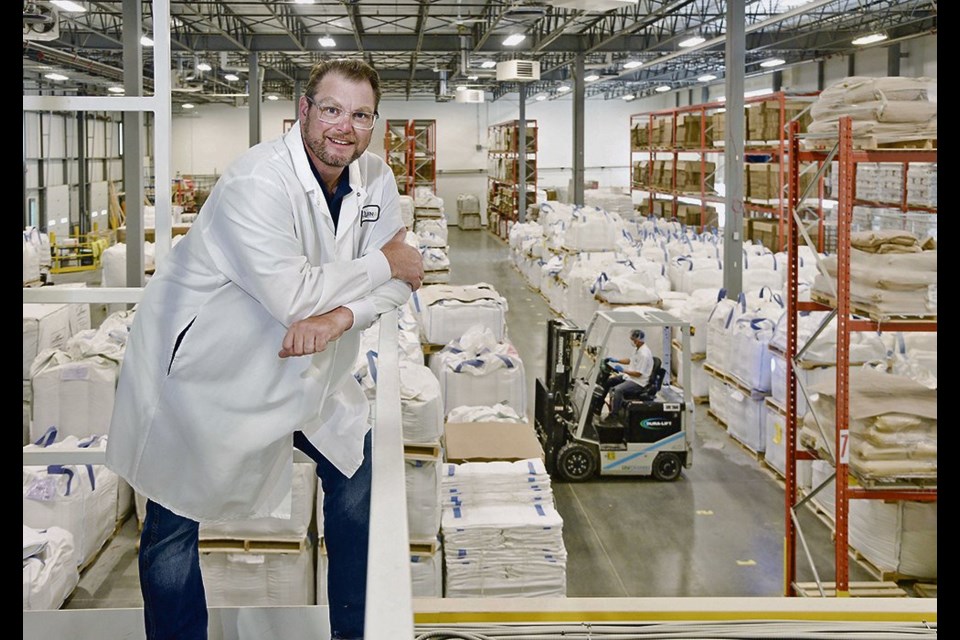REGINA — A Saskatchewan company is planning to disrupt agriculture.
In fact, a page on its website is dedicated to something it calls “disruptive agriculture.”
“For us to pioneer regenerative (farming) at scale, it is disruptive,” said Martin Williams, president and chief innovation officer for Above Food, a plant-based food company that has its head office in Regina.
“When we say disruptive agriculture, it’s intended to question (the) traditional models related to mono-cropping, related to the overuse of hydrocarbon fertilizers…. Disruptive is how you leverage data, how do you leverage agronomics, to inform more sustainable… and frankly, more lucrative agricultural practices.”
Above Food was created in 2017.
One of the company’s founders is Lionel Kambeitz, who is part of Kambeitz Farms, a 70,000-acre farm in the Rural Municipality of Lajord, southeast of Regina.
Above Food is in the food and ingredient business, with a number of branded products sold at grocery stores. The brands include Farmer Direct Organic, a line of packaged pulse crops, Culcherd, a dairy-free cheese and Eat Up, a lineup of gluten-free flours, baking mixes and other products.
In 2020, Above Food merged with Purely Canada, another Saskatchewan company in the ingredient business.
“Purely Canada purchases, processes, transports, and merchandises identity preserved ingredients from Saskatchewan and Alberta to global customers in North America, Asia, Europe, and Africa,” stated a Purely Canada news release from 2020.
“Our portfolio of brands, of which we have nine, we’re in 32 countries,” Williams said from his home in Toronto.
In May, Above Food opened a processing and packaging centre in Saskatoon to expand its ingredient business.
“This is a significant growth opportunity for Above Food… and (to) bring more value to all crops in regenerative agriculture rotations,” said Mike Marshall, president of Above Food Specialty Ingredients.
And, in late July, Above Food announced that it had opened an oat collection facility in Carrot River, Sask.
Above Food has been busy in the last few years, but its ambitions are bigger than buying grains and pulses from prairie farmers and converting those crops into foods and ingredients.
Company leaders believe they can change the connection between farmers and consumers by building a “first of its kind” supply chain. The critical components of the supply chain are traceability and farmers who follow regenerative practices, such as cover crops, diverse crop rotations, less use of fertilizer and minimal tillage.
“More and more consumers are saying… I want to know more about the system that makes my food. Traceability becomes almost an answer, to where my food comes from,” Williams said.
For its Farmer Direct Organic brand, which sells packaged lentils, hemp, beans and peas, the company has a code on the package that identifies where the crop was grown, who packaged and processed the grain and other information.
“With the exception of our oats, which we source from a group of organic farmers, we never mingle product into the same container — resulting in each package being traceable back to a single farm, and a single harvest year,” Farmer Direct Organic states on its website.
Above Food is also creating a supply chain that will tell consumers where, how and who produced the food on their table.
“No one can go literally from off combine… all the way through to consumer-packaged goods, with regenerative agriculture at scale, identity preserved,” Williams said. “No one has knit together this entire value proposition…. We believe this is the future of what food needs to be.”
In an article on Medium.com, a online publishing site, Williams gave an example of how Above Food plans to change the agricultural value chain.
“We take ownership of those oats at the farm(s)…. We mill them into flour in some cases, and in others, we use our proprietary sonic milling technology to transform them into the liquid oat base, which is used in all oat milks,” he said..
“We then have several of our own consumer brands like Culcherd and Eat Up that will use these oat ingredients as the basis of their differentiated food formulations…. This complete control of our value and supply chain enables us to have a greater influence on how these foods are cultivated, transported, processed, formulated, priced, and sold.”
As for the company’s commitment to regenerative ag, Above Food has been working with Kambeitz Farms to develop regenerative protocols and practices.
Williams said demand for foods seen as more healthful by consumers, sometimes called better-for-you foods, has exploded since 2014.
“It’s growing roughly at 14 percent annually, while conventional food is growing at two percent.”
The 14 percent figure comes from a Good Food Institute report on the U.S. market for plant-based foods and data from Mercaris, a market information service for organic and other segments of the food system. The Good Food Institute is a plant-based advocacy group.
That number doesn’t apply to plant-based meat alternatives. The Good Food Institute report said U.S. sales of plant-based meat alternatives grew zero percent in 2021 compared to 2020.
Looking at the U.S. figures in more detail, the purchases of plant-based meat alternatives dropped three percent but the average price increased by three percent.
While sales of plant-based meat alternatives were flat in 2021, the overall category (including plant-based milk, ice cream, cheeses and nutrition bars) grew from US$4.8 billion in the U.S. to $7.4 billion in 2021, a 54 percent increase.
Williams said Canadian agriculture has an advantage in the expanding market for plant-based foods, thanks to Canada’s reputation for being clean, natural and pristine.
“This is a home-grown story, from the Prairies, that really has a competitive and comparative advantage.”




